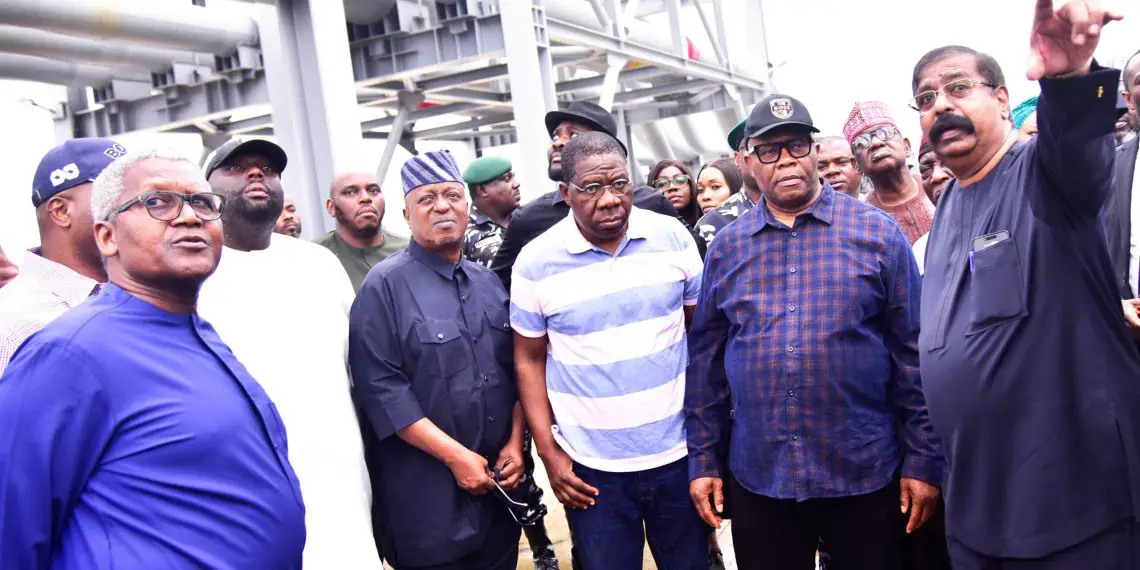News
Dangote Has Shamed Many People By Completing Refinery – Says Akpabio

We Have Plans To Contribute To $1Trn GDP
Senate President Godswill Akpabio says Aliko Dangote, chairman of Dangote Group, shamed many people by completing the 650,000 barrels per day (bpd) petroleum refinery.
Akpabio, who spoke on Saturday during a tour of the facility, described the refiner as the ninth wonder of the world.
The senate president said the refinery is highly commendable, adding that Dangote deserved all the accolades for the feat.
Akpabio condemned those who were sceptical of the completion of the refinery, describing them as “dream killers”.
He said detractors of the refinery had all been silenced and previous governments had been put to shame with the completion of the project.
“They told us in Abuja that Dangote refinery is a farce, but we have come here and see for ourselves that the refinery is alive and running,” he said.
“Dangote has put to shame a lot of people. They are wondering how it will be possible for a single individual to accomplish what a whole nation could not accomplish; what 240 million people could not maintain; what a continent could not do and then one person build a 650,000bpd project.
“They keep wondering how one person can succeed where nations have failed; where the continent failed. But Dangote has done it. It is highly commendable.
“We came to see the refinery because we in the current Senate believe in the Nigerian dream.
“We didn’t come as a doubting Thomas, but we came because we believe in the project; we came to rekindle the hope of Nigerians and the Nigerians’ can-do spirit.”
Akpabio also said the federal government could not make refineries in Kaduna, Port Harcourt, and Warri function but the billionaire and his team proved it is possible to build a functioning refiner in Nigeria.
“The inability of the nation to refine its oil has brought untold hardship on Nigerians so much so that the Belgian government recently banned the exportation of dirty and condemned fuel to West African countries just because we can’t refine our own products,” he added.
Akpabio also said the senate and the entire national assembly would come up with robust legislation that would protect the project and others like it.
“Now that we have seen for ourselves, we are here to announce our own endorsement of this major project. It is also shocking to see that we produce sufficient fertilisers for Nigeria and enough to be exported,” he said.
“As I said, we will do our report, and we will speak to Mr. President to put a stop to fertiliser import to Nigeria. You will hear from us soon.”
In his remarks, Dangote said the goal is to contribute to President Bola Tinubu’s goal of achieving a $1 trillion gross domestic product (GDP).
“The refinery will help boost Nigeria’s economic growth, with the creation of thousands of direct and indirect jobs. During the construction stage, it supported over 150,000 jobs, made up of mostly Nigerians,” he said.
“These Nigerians in the process acquired various skills that are still useful in other construction projects.
“The capacity of the refinery is enough to satisfy domestic demands for refined products. The refinery will export about 50 percent of its production, thereby generating foreign exchange for the country.
“It will lead to growth in adjacent sectors such as logistics, shipping, engineering, and servicing.
“The refinery has the requisite capacity to provide energy security both by providing a ready home for our crude and in ensuring steady availability of petroleum products for all.
“We are thus making an important contribution to this administration’s plan to grow our GDP to $1 trillion.
“Our group is at the vanguard of job creation and employment generation in Nigeria. We are the biggest employer of labour after the federal government.
“Dangote Cement sustains about 70,000 direct and indirect jobs across Africa, while the refinery, petroleum chemical complex, and fertiliser will be able to create over 150,000 direct and indirect jobs.
“We envision in Nigeria the equivalent of Jamnagar in India where crude oil refining is the backbone of specialised industrial zones, transportation networks, and ancillary industries, contributing to the overall industrialisation of the region. Or Saudi Arabia’s Jubail Industrial City, which is also undergirded by large-scale petrochemical complexes.”
Aliko said the legislature has a great role to play in achieving all the set targets and supporting the refinery in securing the benefits.